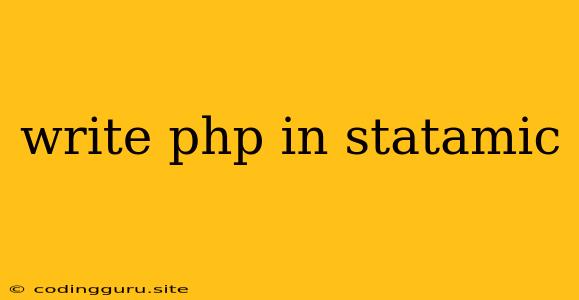Writing PHP in Statamic: A Guide to Extend Your CMS Power
Statamic is a powerful headless CMS that simplifies website creation and management. While it boasts an intuitive interface and a robust template system, you might find situations where you need to leverage the flexibility and power of PHP for specific functionalities. This guide will walk you through how to write PHP code within your Statamic projects to expand your CMS capabilities.
Why Use PHP in Statamic?
Statamic primarily relies on its own templating language, which is powerful and efficient for most scenarios. However, some tasks might require the flexibility and control offered by PHP, such as:
- Custom logic and calculations: Complex calculations or data manipulation that go beyond the capabilities of Statamic's templating language.
- Integration with external APIs: Calling external APIs or services using PHP libraries.
- Database interaction: Directly interacting with your database for more advanced queries or data management.
- Custom data processing: Handling data transformations or complex logic for specific functionalities.
Writing PHP Code in Statamic
Statamic offers several ways to integrate PHP code into your project. The approach you choose will depend on the complexity and scope of your task.
1. Using the php() Function:
For simple PHP snippets, you can use the php() function directly within your Statamic templates. This function allows you to execute PHP code within the context of the current template.
The current date is: {{ php(date('Y-m-d')) }}
2. Creating Custom Addons:
More complex tasks often benefit from creating custom addons, which are essentially reusable PHP components. Addons can extend Statamic's core functionality and provide access to its internal API.
To create an addon, you'll need to:
- Create a PHP file: This file will contain your custom code and should be placed within the
addonsdirectory of your Statamic project. - Register the addon: You need to register your addon in Statamic's configuration file (
config/statamic/addons.php) to make it available within your project.
Here's a simple addon example that adds a "Hello World" message to your content:
3. Using the statamic Global Variable:
Statamic provides a global variable named statamic that grants access to various methods and functionalities. This variable is accessible within your PHP code and can be used to interact with Statamic's core features.
entry();
// Get the entry's title
$title = $entry->get('title');
// Display the title
echo $title;
4. Extending Statamic's Core:
For more advanced customizations, you can directly extend Statamic's core classes. This allows you to override existing behavior and create your own custom functionality.
Important Considerations:
- Security: Always sanitize input data and implement proper security measures when working with PHP code within Statamic.
- Performance: Minimize the use of PHP code for performance optimization, as it can affect your website's loading speed.
- Documentation: Refer to Statamic's official documentation for detailed information on addon development, core extension, and the
statamicglobal variable.
Example: Implementing a Custom Search Functionality
Let's illustrate how to use PHP within Statamic to implement a custom search functionality.
1. Create an Addon:
get('q');
// Perform a custom search based on the query
$entries = $this->getEntries($query);
// Return the search results
return $this->view('search-results', [
'entries' => $entries,
]);
}
private function getEntries($query)
{
// Replace this with your custom search logic
$entries = $statamic->entryRepository()->search($query);
return $entries;
}
public function view($name, $data = [])
{
return $this->view('addons/custom-search/' . $name, $data);
}
}
2. Create a Search Template:
{{ if entries }}
{{ each entries as entry }}
-
{{ entry.title }}
{{ endforeach }}
{{ else }}
No results found.
{{ endif }}
3. Register the Addon:
[
// ... other addons
'CustomSearch' => Statamic\Addons\CustomSearch::class,
],
];
4. Use the Addon in Your Template:
Conclusion
Writing PHP code in Statamic empowers you to extend your CMS capabilities beyond its default functionality. By leveraging PHP, you can implement custom logic, integrate with external systems, and create unique experiences for your users. Remember to prioritize security and performance when working with PHP in Statamic, and utilize Statamic's documentation for guidance and best practices.
